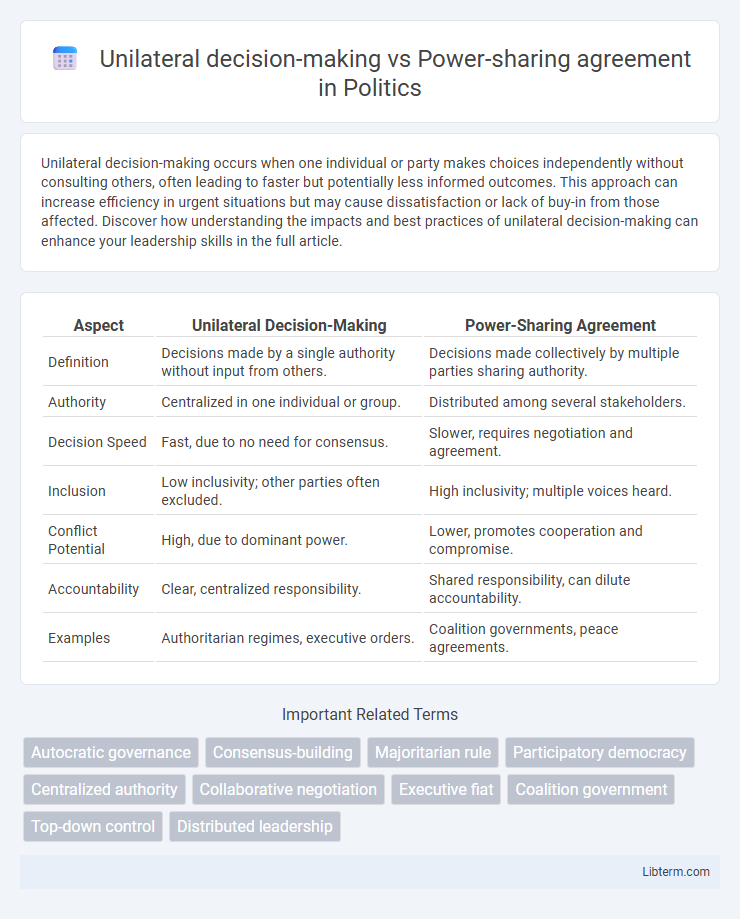Unilateral decision-making occurs when one individual or party makes choices independently without consulting others, often leading to faster but potentially less informed outcomes. This approach can increase efficiency in urgent situations but may cause dissatisfaction or lack of buy-in from those affected. Discover how understanding the impacts and best practices of unilateral decision-making can enhance your leadership skills in the full article.
Table of Comparison
| Aspect | Unilateral Decision-Making | Power-Sharing Agreement |
|---|---|---|
| Definition | Decisions made by a single authority without input from others. | Decisions made collectively by multiple parties sharing authority. |
| Authority | Centralized in one individual or group. | Distributed among several stakeholders. |
| Decision Speed | Fast, due to no need for consensus. | Slower, requires negotiation and agreement. |
| Inclusion | Low inclusivity; other parties often excluded. | High inclusivity; multiple voices heard. |
| Conflict Potential | High, due to dominant power. | Lower, promotes cooperation and compromise. |
| Accountability | Clear, centralized responsibility. | Shared responsibility, can dilute accountability. |
| Examples | Authoritarian regimes, executive orders. | Coalition governments, peace agreements. |
Understanding Unilateral Decision-Making
Unilateral decision-making involves a single authority making choices without consultation, often resulting in faster resolutions but limited stakeholder input. This approach can undermine collaboration and lead to resistance or lack of commitment from other parties. Understanding its implications is crucial for balancing efficiency with inclusive governance in organizational or political contexts.
Defining Power-Sharing Agreements
Power-sharing agreements are political arrangements designed to distribute executive authority among different parties or groups, ensuring representation and inclusion in governance processes. These agreements often arise in contexts of ethnic, religious, or political division to prevent dominance by a single faction and promote stability. Defined by structured collaboration, power-sharing aims to balance competing interests through mechanisms like coalition governments, mutual vetoes, or proportional representation.
Historical Contexts of Both Approaches
Unilateral decision-making often emerged in historical contexts marked by centralized authority, such as monarchies and authoritarian regimes, where power was concentrated in the hands of a single ruler or elite group. Power-sharing agreements gained prominence during post-colonial transitions, peace processes, and democratic consolidations, exemplified by the 1994 South African Government of National Unity and the Good Friday Agreement in Northern Ireland. These approaches reflect contrasting governance models shaped by historical legacies of control versus negotiated coexistence, influencing political stability and conflict resolution strategies worldwide.
Key Advantages of Unilateral Decision-Making
Unilateral decision-making streamlines processes by enabling swift and decisive actions without the delays encountered in consensus-building typical of power-sharing agreements. This approach enhances accountability by clearly assigning responsibility to a single decision-maker, reducing ambiguity in outcome ownership. Organizations or governments benefit from increased agility in crisis situations, where rapid decisions are crucial for effective response and maintaining control.
Benefits of Power-Sharing Agreements
Power-sharing agreements promote political stability by ensuring inclusive representation of diverse groups, reducing the risk of conflict and fostering national unity. These agreements enhance decision-making legitimacy, as policies are more likely to reflect the interests of all stakeholders involved. Furthermore, power-sharing arrangements encourage cooperation and compromise, which can lead to more sustainable and effective governance outcomes.
Risks and Drawbacks of Unilateral Actions
Unilateral decision-making often leads to increased risks such as reduced stakeholder buy-in, potential conflicts, and a lack of diverse perspectives, which can undermine the legitimacy and effectiveness of decisions. This approach may result in power imbalances, alienating key parties and causing long-term damage to relationships within organizations or governments. In contrast, power-sharing agreements promote collaborative governance, mitigating these risks by distributing authority and encouraging consensus-building.
Challenges in Implementing Power-Sharing
Implementing power-sharing agreements faces significant challenges such as deep-seated mistrust among political parties, unequal power distribution, and competing interests that hinder cooperation. Institutional weaknesses and lack of clear mechanisms for conflict resolution exacerbate difficulties in maintaining stability and effective governance. These obstacles often lead to frequent breaches of agreements, undermining the intended goals of inclusivity and peace.
Impact on Governance and Policy Outcomes
Unilateral decision-making centralizes authority, enabling rapid policy implementation but often risks marginalizing stakeholder input and undermining transparency, which can lead to governance challenges and reduced public trust. Power-sharing agreements distribute decision-making authority among diverse groups, promoting inclusive governance and balanced policy outcomes, though they may slow the decision process and require complex negotiation. The impact on governance hinges on the trade-off between efficiency and inclusivity, with power-sharing generally fostering more sustainable and representative policy decisions.
Case Studies: Successes and Failures
The 1995 Dayton Agreement exemplifies successful power-sharing, resolving the Bosnian conflict through inclusive governance structures, while the unilateral decision-making approach of the 2003 US invasion of Iraq led to prolonged instability and insurgency. In South Africa, the negotiated power-sharing deal ending apartheid fostered democratic transition and reconciliation, contrasting with Zimbabwe's unilateral land reform policies that triggered economic collapse and political turmoil. These case studies highlight that power-sharing agreements often enable sustainable peace and political stability, whereas unilateral decisions tend to exacerbate conflicts and societal divisions.
Choosing the Right Approach for Sustainable Solutions
Unilateral decision-making centralizes authority, enabling swift action but potentially ignoring diverse perspectives crucial for sustainable solutions. Power-sharing agreements foster collaboration among stakeholders, ensuring inclusive input and greater commitment to agreed-upon outcomes. Selecting the right approach depends on the context's complexity, stakeholder diversity, and the long-term sustainability goals.
Unilateral decision-making Infographic

 libterm.com
libterm.com